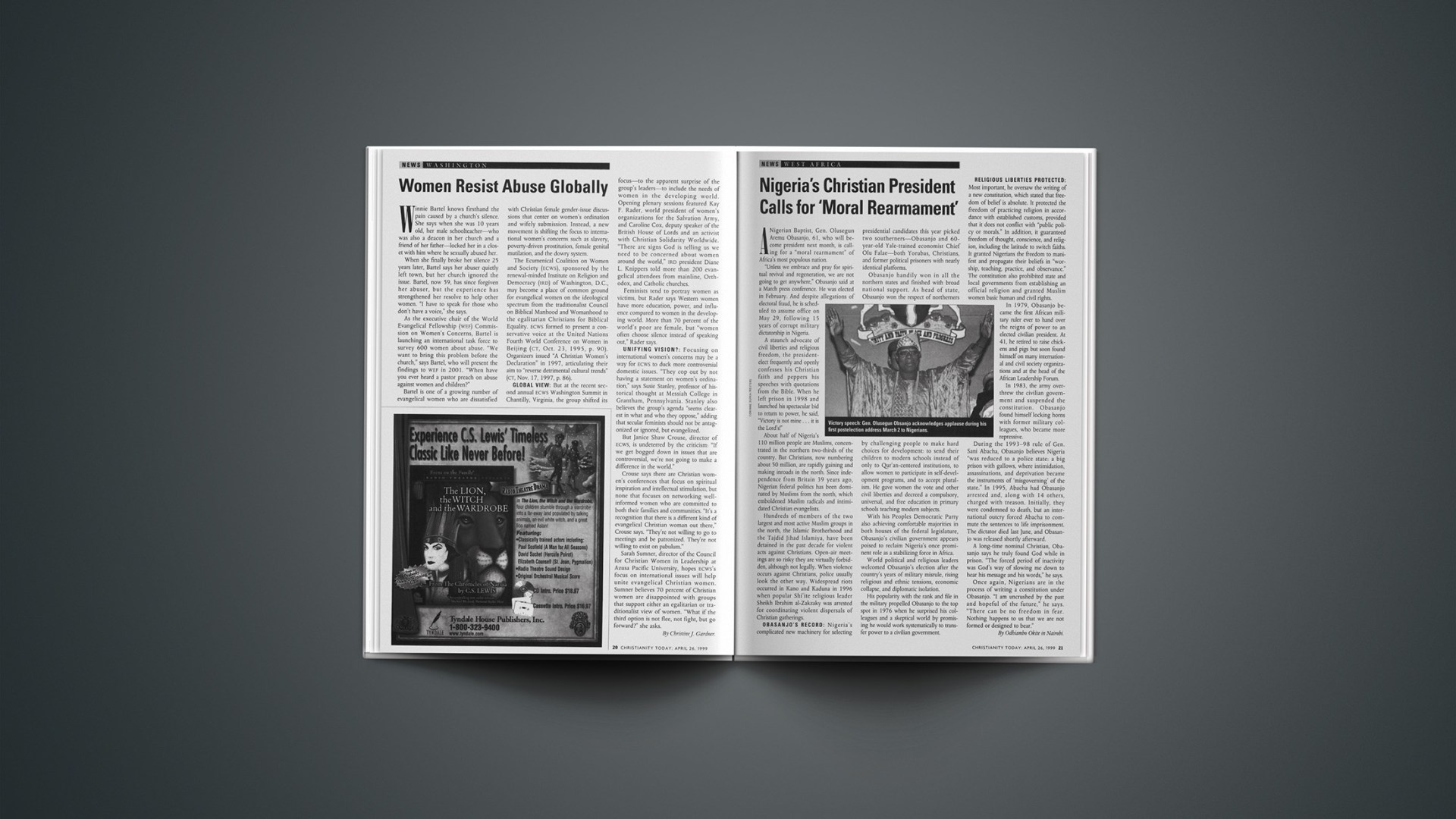A Nigerian Baptist, Gen. Olusegun Aremu Obasanjo, 61, who will be come president next month, is calling for a “moral rearmament” of Africa’s most populous nation.
“Unless we embrace and pray for spiritual revival and regeneration, we are not going to get anywhere,” Obasanjo said at a March press conference. He was elected in February. And despite allegations of electoral fraud, he is scheduled to assume office on May 29, following 15 years of corrupt military dictatorship in Nigeria.
A staunch advocate of civil liberties and religious freedom, the president-elect frequently and openly confesses his Christian faith and peppers his speeches with quotations from the Bible. When he left prison in 1998 and launched his spectacular bid to return to power, he said, “Victory is not mine … it is the Lord’s!”
About half of Nigeria’s 110 million people are Muslims, concentrated in the northern two-thirds of the country. But Christians, now numbering about 50 million, are rapidly gaining and making inroads in the north. Since independence from Britain 39 years ago, Nigerian federal politics has been dominated by Muslims from the north, which emboldened Muslim radicals and intimidated Christian evangelists.
Hundreds of members of the two largest and most active Muslim groups in the north, the Islamic Brotherhood and the Tajdid Jihad Islamiya, have been detained in the past decade for violent acts against Christians. Open-air meetings are so risky they are virtually forbidden, although not legally. When violence occurs against Christians, police usually look the other way. Widespread riots occurred in Kano and Kaduna in 1996 when popular Shi’ite religious leader Sheikh Ibrahim al-Zakzaky was arrested for coordinating violent dispersals of Christian gatherings.
OBASANJO’S RECORD: Nigeria’s complicated new machinery for selecting presidential candidates this year picked two southerners—Obasanjo and 60-year-old Yale-trained economist Chief Olu Falae—both Yorubas, Christians, and former political prisoners with nearly identical platforms.
Obasanjo handily won in all the northern states and finished with broad national support. As head of state, Obasanjo won the respect of northerners by challenging people to make hard choices for development: to send their children to modern schools instead of only to Qur’an-centered institutions, to allow women to participate in self-development programs, and to accept pluralism. He gave women the vote and other civil liberties and decreed a compulsory, universal, and free education in primary schools teaching modern subjects.
With his Peoples Democratic Party also achieving comfortable majorities in both houses of the federal legislature, Obasanjo’s civilian government appears poised to reclaim Nigeria’s once prominent role as a stabilizing force in Africa.
World political and religious leaders welcomed Obasanjo’s election after the country’s years of military misrule, rising religious and ethnic tensions, economic collapse, and diplomatic isolation.
His popularity with the rank and file in the military propelled Obasanjo to the top spot in 1976 when he surprised his colleagues and a skeptical world by promising he would work systematically to transfer power to a civilian government.
RELIGIOUS LIBERTIES PROTECTED: Most important, he oversaw the writing of a new constitution, which stated that freedom of belief is absolute. It protected the freedom of practicing religion in accordance with established customs, provided that it does not conflict with “public policy or morals.” In addition, it guaranteed freedom of thought, conscience, and religion, including the latitude to switch faiths. It granted Nigerians the freedom to manifest and propagate their beliefs in “worship, teaching, practice, and observance.” The constitution also prohibited state and local governments from establishing an official religion and granted Muslim women basic human and civil rights.
In 1979, Obasanjo be came the first African military ruler ever to hand over the reigns of power to an elected civilian president. At 41, he retired to raise chickens and pigs but soon found himself on many international and civil society organizations and at the head of the African Leadership Forum.
In 1983, the army overthrew the civilian government and suspended the constitution. Obasanjo found himself locking horns with former military colleagues, who became more repressive.
During the 199398 rule of Gen. Sani Abacha, Obasanjo believes Nigeria “was reduced to a police state: a big prison with gallows, where intimidation, assassinations, and deprivation became the instruments of ‘misgoverning’ of the state.” In 1995, Abacha had Obasanjo arrested and, along with 14 others, charged with treason. Initially, they were condemned to death, but an international outcry forced Abacha to commute the sentences to life imprisonment. The dictator died last June, and Obasanjo was released shortly afterward.
A long-time nominal Christian, Obasanjo says he truly found God while in prison. “The forced period of inactivity was God’s way of slowing me down to hear his message and his words,” he says.
Once again, Nigerians are in the process of writing a constitution under Obasanjo. “I am uncrushed by the past and hopeful of the future,” he says. “There can be no freedom in fear. Nothing happens to us that we are not formed or designed to bear.”
Copyright © 1999 Christianity Today. Click for reprint information.










